#'60s country
Explore tagged Tumblr posts
Text
291: Marty Robbins // Devil Woman

Devil Woman Marty Robbins 1962, Columbia
“Much talent is transient—time, our sternest critic, often decrees that today’s rage may be forgotten tomorrow. But the songs of Marty Robbins are certain to be played and sung as long as mankind cherishes music.” So ends Bob Tubert’s liner note for Marty Robbins’ 1962 LP Devil Woman, the third highest-charting album on the pop charts (#35) of the singer’s career, and home to one of his signature tunes in the million-selling title track (a country #1, pop #16). Here in 2024, the record isn’t on Spotify; isn’t reviewed on AllMusic.com; has zero reviews on RateYourMusic.com; lacks a Wikipedia page; has been reissued as a standalone album on CD exactly once that I’m aware of (in 2016) and hasn’t been repressed on vinyl since the late ‘70s.
This guy was the most popular country crossover artist in America for a few years there, a vocalist and songwriter with few peers in his genre! But such is the fate of a country icon, an endless stream of compilations but little to no consideration of their albums as albums. This is especially true of the ���60s and ‘70s period, when country labels hosed the shelves with product like Stone Cold Steve Austin giving the Corporation a beer bath (Robbins had four LPs in 1961-62 alone), but it’s also a holdover of a critical apparatus that would happily give a sober appraisal of the least effort by the fucking New Riders of the Purple Sage while glossing over nearly the entire career of a George Jones or a Don Gibson.
youtube
Anyway, now that I’ve thoroughly beat my breast over something I was barely mad about before five minutes ago, I’ll just note that Devil Woman is as sturdy a record as anything on the shelves in the era. Released just three years after his towering Gunfighter Ballads and Trail Songs (one of the ten best albums of the 1950s), co-produced by Gunfighter’s Don Law and returning most of the same band, this one’s a sure shot for a classic country fan. Devil Woman steers well clear of the hysterically tragic cowboy melodrama of Robbins’ masterpiece, with only the Spanish-inflected title track and closer “The Wine Flowed Freely” really setting any big narrative stakes, but it’s nice not hearing Marty die at the end of every song. Marty had the voice of an angel, and even his bounciest music has a feathery touch: “Progressive Love” could’ve been a Gene Austin number; “I’m Beginning to Forget” trades his trusty acoustic for a ukelele; “In the Ashes of an Old Love Affair” is like standing outside a lightly fogged diner window watching a man wait for a woman who’s not gonna show. To be honest, the title track isn’t among my favourites (the adultering protagonist needs to grow up and take some responsibility for himself), but I’d walk the floor all night for “Ain’t Life a Crying Shame,” a slinky honky tonk tune that gets right under my skin.
Devil Woman isn’t a life-changer, but it’s an album I could leave on my turntable for a week while I work without it ever grating. That’s a kind of craftsmanship that merits genuine consideration from any music lover.
291/365
4 notes
·
View notes
Text
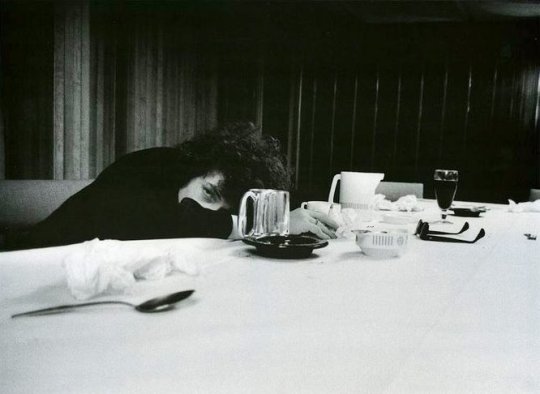
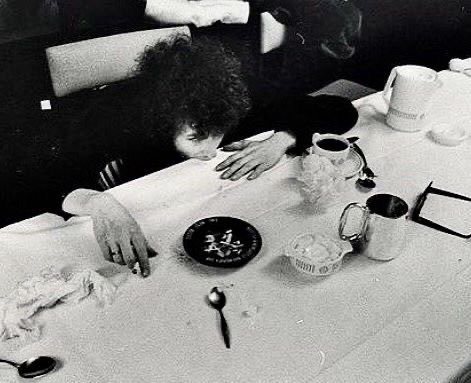
Bob Dylan eating breakfast (and the table) in Birmingham, England, 1966 ♡ Photographed by Barry Feinstein
#bob dylan#folk rock#country rock#aesthetic#fashion#photography#vintage#music#beatnik#60s#1960s#england#birmingham#1966#sixties#swinging sixties#60s fashion#1960s fashion#60s aesthetic#1960s style#mood#rock n roll#rock music#musician#romantic academia#dark academia#folk#folk music#photo#black and white
3K notes
·
View notes
Text


"Laughter through tears is my favorite emotion."
Dolly Parton, Tennessee, 1997.
Ph. Jim Herrington.
#dolly parton#60s icons#rock n roll#tennessee#country singer#aesthetic#vintage#old school cool#style#beauty#90s aesthetic#90s fashion#90s nostalgia#laughter through tears#emotion#classic car
790 notes
·
View notes
Text
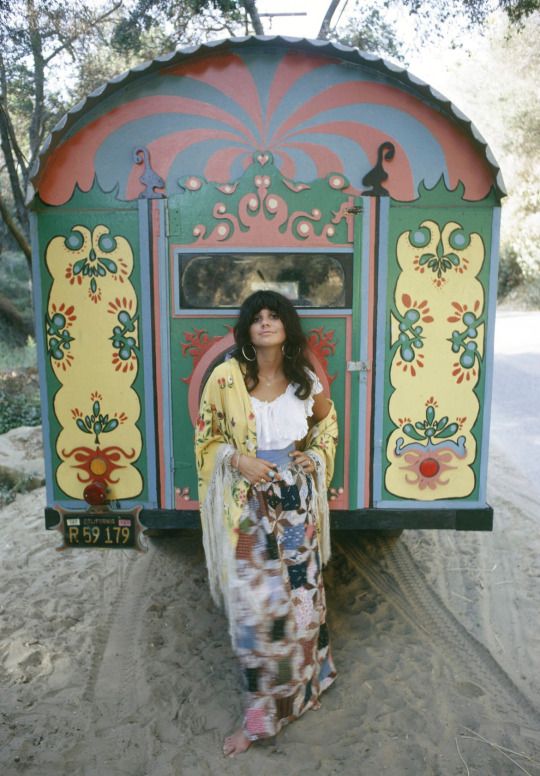
linda ronstadt photographed by ed caraeff in topanga, california, august 22, 1971
#linda ronstadt#1971#70s#70s fashion#70s hair#70s aesthetic#classic rock#vintage#70s music#country rock#retro#1970s#60s 70s 80s 90s#vinyl
2K notes
·
View notes
Text
October Country - My Girlfriend is a Witch 1968
October Country was an American folk rock band formed in Los Angeles, California, in 1967. They recorded one self-titled album in 1968 and is best-remembered for the track "My Girlfriend Is a Witch". They are credited as the musicians for the 1968 Steven Spielberg short-film, Amblin'.
"My Girlfriend Is a Witch" received a total of 79,4% yes votes!
youtube
488 notes
·
View notes
Text




𝗂𝗍𝗌 𝗄𝗂𝗇𝖽𝖺 𝗁𝖺𝗋𝖽 𝗍𝗈 𝖿𝗂𝗇𝖽 𝗅𝗈𝗏𝖾 𝗐𝗁𝖾𝗇 𝗒𝗈𝗎'𝗋𝖾 𝗎𝗌𝖾𝖽 𝗍𝗈 𝗋𝗈𝗅𝗅𝗂𝗇 𝗅𝗂𝗄𝖾 𝖺 𝗋𝗈𝗅𝗅𝗂𝗇 𝗌𝗍𝗈𝗇𝖾
#lana del rey#girlblogging#hell is a teenage girl#this is what makes us girls#girl interrupted#this is a girlblog#female hysteria#country aesthetic#nancy sinatra#beige#lana del ray aka lizzy grant#lana del ray aesthetic#im just a girl#lizzy grant#lizzy grant aesthetic#girlblogger#gaslight gatekeep girlblog#manic pixie dream girl#tumblrina#60s aesthetic#girl interupted syndrome#lana is god#americana#southern americana#southern aesthetic#coquette dollete
240 notes
·
View notes
Text


Remembering John Denver on what would have been his 81st birthday.
#john denver#1970s#1960s#folk#music#folk music#country#60s#70s#december 31#1943#birthday#country roads#1970s vintage#1960s music#1970s music#1960s vintage
206 notes
·
View notes
Text

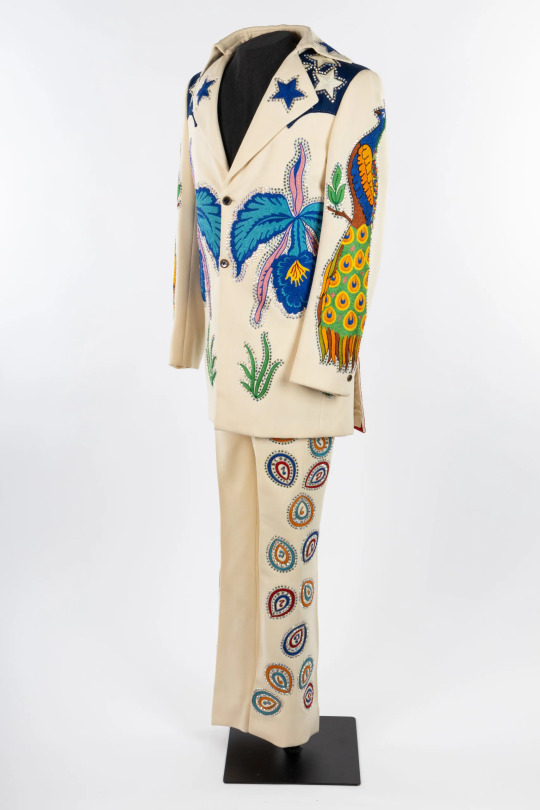

Michael Nesmith Nudie’s Rodeo Tailors embroidered and rhinestone-accented stage outfit, hat and boots (circa 1967-69), photographed by Bob Delevante.
An influential outfit if ever there was one in the genre. Nesmith was country-rock when country-rock wasn’t cool, when he was still in the Monkees. This rhinestone-accentuated suit — with chain-stitched peacocks, orchids, musical notes and American flag motifs — also came from Nudie’s Rodeo Tailors, circa 1967. It predates the famous Flying Burrito Brothers suits of a similar nature.
“He wore it to the premiere of ‘Head,’ and on the last Monkees television special, ’33 1/3.’ As soon as we decided to do this exhibit, this was one of the first artifacts we thought of, like, ‘Oh, we’ve gotta have that.’ You know, we had a little bit of a relationship with Michael because he was featured in the Bob Dylan/Johnny Cash ‘Nashville Cats’ exhibit that we did, and he came and played an album release party for that, and we got to know him a little and had a relationship going. We asked if we could borrow this, and he made it clear that he absolutely wanted it to come here. And then just with the timing… by circumstance, the same week he passed, we’re getting notices that the shipment is on its way to Nashville. It was just interesting timing.”
— Michael Gray, The Country Music Hall of Fame and Museum {x}
908 notes
·
View notes
Text

Me, every time I leave the house.
70 notes
·
View notes
Text
1: Various Artists // Keep on Truckin'
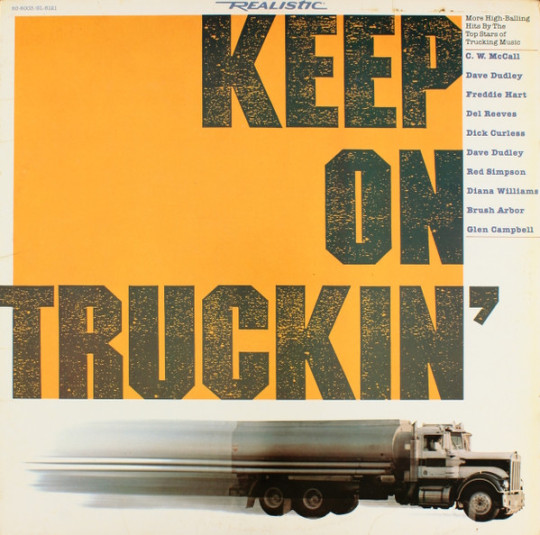
Keep on Truckin' Various Artists 1979, Realistic Records
America was big rig crazy in the mid-to-late ‘70s, as this novelty compilation attests. Released on Radio Shack’s in-house Realistic label, Keep On Truckin’ collects a hodgepodge of sides by trucker country stalwarts. There were dozens of similarly themed comps on the market at the time and while there isn’t anything particularly special about this one, it’s a fun representative of a forgotten fad.
Social and economic factors played their parts in moulding the figure of the long-haul trucker into the era’s diesel-powered avatar of individualism, but it wouldn’t be an American story without some help from the advertising world. Omaha-based ad man Bill Fries created the character of singing truck driver C.W. McCall for a regional series of television commercials hocking Old Home Bread. Fries provided talk-sung narration for the ads, in which the affable C.W. (a dead ringer for, uh, documentary film performer Steve Holmes) flirts with blonde waitress Mavis Davis over various buns, rolls, and cakes.
youtube
The spots were a local phenomenon, but even Fries was surprised when the cash-in singles he released as the C.W. character became national hits. By the time “Convoy” reached #1 on the Billboard Hot 100 in 1975, trucker country was everywhere. (For context, this would be like if a 2000s Folgers commercial had sparked renewed interest in incest.)
In fairness, the account above is a bit of an oversimplification. Singers like Dave Dudley (who sounds kinda like Don Gibson and shows up twice on Keep On Truckin’) had been recording songs about truckers since at least the mid-1960s, and most of the best numbers here are by genre veterans. My fav is Dick Curless, a tough-looking one-eyed bastard with a bass-baritone to rival Johnny Cash. His strutting “Drag ‘Em Off the Interstate, Sock it to ‘Em, J.P. Blues” drips with condescension for crooked rural police, even pulling out a siren-mocking slide whistle during the chorus.
youtube
The most memorable tune, however, is “Teddy Bear’s Last Ride,” a deranged 1976 single by the otherwise unknown Diana Williams. Earlier that same year, Red Sovine had a major country hit with “Teddy Bear”, a maudlin story song about “a little cripple boy” whose trucker father had been killed in a highway accident. The lonely child turns to talking to random truckers over his CB radio for comfort. As you'd expect, after he gives his address out over the air dozens of them quickly descend upon his home to “ride little Teddy Bear” before his mother gets home. (He's delighted.)
Diana Williams’ hastily cut ‘sequel’ was written and recorded without Sovine’s involvement. She doubles down on the treacle by killing Teddy Bear off and depositing his corpse into a black mack truck that serves as a makeshift hearse. There’s something endearingly bald-faced about Williams’ attempt to ring out any last droplets Sovine’s original might have left hanging in the listener’s tear ducts.
youtube
Keep On Truckin’ throws in a song about a drag race between a diesel and a flying saucer, a Glen Campbell recording from 1962, and a heap of serviceable-at-worst ‘70s honky tonk in a Waylon Jennings vein. That’s something like the platonic ideal of a dollar bin darling. Honk if you’re lonesome tonight.
1/365
#country music#trucks#vinyl#big rigs#music review#c.w. mccall#'60s music#'70s music#'60s country#'70s country#glen campbell#diana williams#red sovine#novelty music#dick curless
2 notes
·
View notes
Text

𝐄𝐦𝐦𝐲𝐥𝐨𝐮 𝐇𝐚𝐫𝐫𝐢𝐬 𝐛𝐲 𝐆𝐢𝐣𝐬𝐛𝐞𝐫𝐭 𝐇𝐚𝐧𝐞𝐤𝐫𝐨𝐨𝐭 (𝟏𝟗𝟕𝟓)
#emmylou#emmylou harris#1970s#70s#1975#seventies#photography#black and white photography#styleicon#fashion#60s icons#folk#country#american singer#60s music#60s musicians
217 notes
·
View notes
Text

Johnny Cash, 1962
- Photograph by Leigh Wiener
#johnny cash#aesthetic#vintage#old school cool#style#60s icons#country music#man in black#guitar legend
1K notes
·
View notes
Text

dolly parton photographed by les leverett, 1970
#dolly parton#1970#70s#vintage#1970s#70s fashion#70s hair#70s makeup#country#pop#70s music#70s aesthetic#60s 70s 80s 90s#60s#music#1971#60s makeup#70s style#70s icon#groovy#retro
359 notes
·
View notes
Text
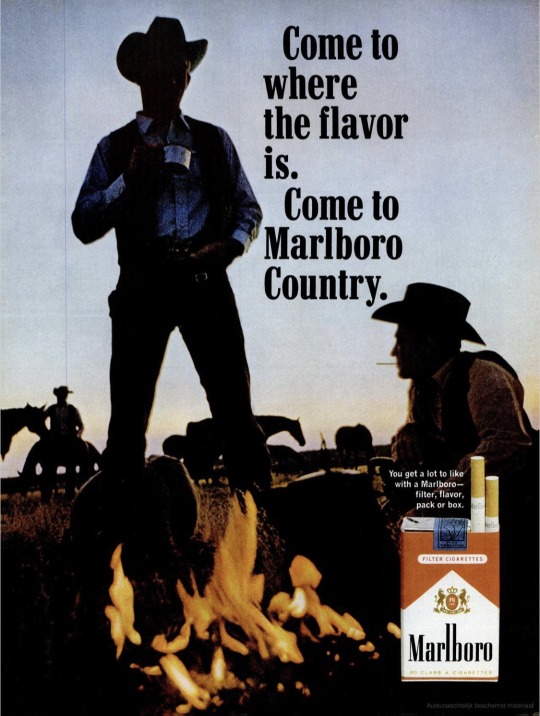
1967 Marlboro Cigarettes
#1967#Marlboro#cigarettes#tobacco#smoking#country#cowboys#fire#flavor#vintageadsmakemehappy#vintage magazine#vintage advertising#magazine#advertising#60s#1960s
492 notes
·
View notes
Text

faye dunaway in bonnie and clyde (1967)
#girlblogging#just girly things#girly aesthetic#girly blog#coquette#coquette aesthetic#american teenager#bonnie and clyde#1970s country#1970s americana#60s aesthetic#60s fashion#60s#60s icons#60s movies#70s western#70s country#70s film#70s fashion#70s#film#cinephile#letterboxd#faye dunaway#it girl#faye dunaway bonnie and clyde#faye dunaway 1960s#americana#americana aesthetic#americana core
225 notes
·
View notes
Text
Song of the Day
"Call of the moose" Willy Mitchell, 1980 As you might know, September 30th is Truth and Reconciliation day (more commonly known as Orange Shirt Day), a national day in Canada dedicated to spreading awareness about the legacy of Residential schools on Indigenous people. Instead of just focusing on a song, I also wanted to briefly talk about the history of the sixties scoop and its influence on Indigenous American music and activism.
The process of Residential schooling in Canada existed well before the '60s, but the new processes of the sixties scoop began in 1951. It was a process where the provincial government had the power to take Indigenous children from their homes and communities and put them into the child welfare system. Despite the closing of residential schools, more and more children were being taken away from their families and adopted into middle-class white ones.
Even though Indigenous communities only made up a tiny portion of the total population, 40-70% of the children in these programs would be Aboriginal. In total, 20,000 children would be victims of these policies through the 60s and 70s.
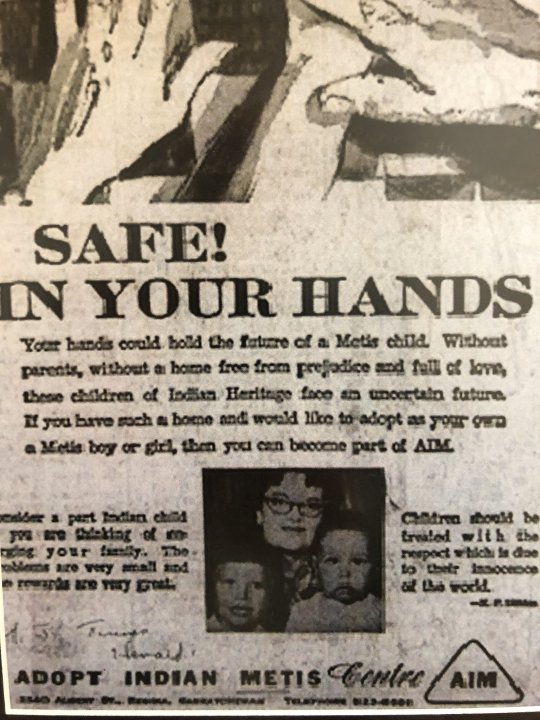
These adoptions would have disastrous effects on their victims. Not only were sexual and physical abuse common problems but the victims were forcibly stripped of their culture and taught to hate themselves. The community panel report on the sixties scoop writes:
"The homes in which our children are placed ranged from those of caring, well-intentioned individuals, to places of slave labour and physical, emotional and sexual abuse. The violent effects of the most negative of these homes are tragic for its victims. Even the best of these homes are not healthy places for our children. Anglo-Canadian foster parents are not culturally equipped to create an environment in which a positive Aboriginal self-image can develop. In many cases, our children are taught to demean those things about themselves that are Aboriginal. Meanwhile, they are expected to emulate normal child development by imitating the role model behavior of their Anglo-Canadian foster or adoptive parents."
and to this day indigenous children in Canada are still disproportionately represented in foster care. Despite being 5% of the Total Canadian population, Indigenous children make up 53.8% of all children in foster care.
I would like to say that the one good thing that came out of this gruesome and horrible practice of state-sponsored child relocation was that there was a birth of culture from protest music, but there wasn't. In fact, Indigenous music has a long history of being erased and whitewashed from folk history.
From Buffy Saint-Marie pretending to be Indigenous to the systematic denial of first nations people from the Canadian mainstream music scene, the talented artists of the time were forcibly erased.
Which is why this album featuring Willy Mitchell is so important.

Willy Mitchell and The Desert River Band
This Album was compiled of incredibly rare, unheard folk and rock music of North American indigenous music in the 60s-80s. It is truly, a of a kind historical artifact and a testimony to the importance of archival work to combat cultural genocide. Please give the entire thing a listen if you have time. Call of the Moose is my favorite song on the album, written and performed by Willy Mitchell in the 80s. His Most interesting song might be 'Big Policeman' though, written about his experience of getting shot in the head by the police. He talks about it here:
"He comes there and as soon as I took off running, he had my two friends right there — he could have taken them. They stopped right there on the sidewalk. They watched him shootin’ at me. He missed me twice, and when I got to the tree line, he was on the edge of the road, at the snow bank. That’s where he fell, and the gun went off. But that was it — he took the gun out. He should never have taken that gun out. I spoke to many policemen. And judges, too. I spoke with lawyers about that. They all agreed. He wasn’t supposed to touch that gun. So why did I only get five hundred dollars for that? "
These problems talked about here, forced displacement, cultural assimilation, police violence, child exploitation, and erasure of these crimes, still exist in Canada. And so long as they still exist, it is imperative to keep talking about them. Never let the settler colonial government have peace; never let anyone be comfortable not remembering the depth of exploitation.
Every Child Matters
#orange shirt day#truth and reconciliation#first nations#song of the day#indigenous folk#canadian history#sixties scoop#indigenous music#folk#folk revival#folk music#folk rock#60s#willy mitchell#song history#60s country#80s music#protest folk#music history#residential schools#american folk#american folk revival#Spotify
113 notes
·
View notes